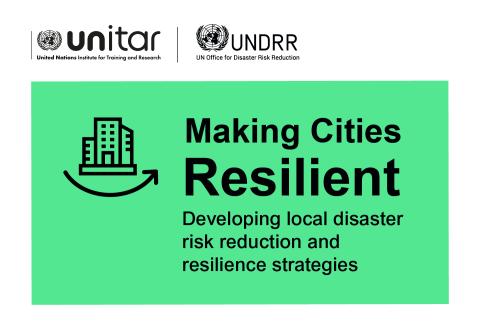
UNITAR Online Catalogue
Making Cities Resilient: Developing Local Disaster Risk Reduction and Resilience Strategies

Population
Arrière plan
Over the past 20 years, disasters have affected billions of people, caused USD$ trillions of damage, and killed millions of people. Disasters have affected people living in developing countries and, in particular, the most vulnerable communities within these countries.
Particularly in the context of increased urbanization, the urban risk continues to rise. The vulnerability of cities to disasters is growing especially as poor people settle in high-risk urban areas. Unfortunately, the planning and development of cities have given little consideration to the consequences of hazards such as earthquakes, hydro-meteorological risks, and others. The implication of this reality is the need for countries to focus on creating a safer world for urban dwellers and developing a series of innovative approaches to build resilience.
On the basis of these needs, UNITAR in partnership with UNDRR developed the e-learning course “Making Cities Resilient: Developing Local Disaster Risk Reduction and Resilience Strategies - Accessible Edition”.
Objectifs de l'événement
This e-learning course aims to strengthen the capacities of government officials, especially those at the local level, and disaster management professionals to design and implement plans and programs that reduce disaster risk and enhance resilience.
Objectifs d'apprentissage
At the end of the course, participants will be able to:
- Analyse the outcome, goal and implementation of the Sendai Framework for Disaster Risk Reduction 2015-2030
- Identify initiatives and best practices on how to integrate disaster risk reduction and climate change adaptation into urban planning
- Assess the risk management situation in their cities by using the Disaster Resilience Scorecard for Cities
- Understand how to develop a safe and resilient country/city action plan
- Raise awareness about the Making Cities Resilient 2030 (MCR2030) initiative
Contenu et structure
Module 1: Disaster Risk Reduction concepts and Introduction to Current Trends in Urban Risk
Module 2: Implementing the Sendai Framework for Disaster Risk Reduction (2015 - 2030)
Module 3: Assessing City's Risk Management and introduction to Making Cities Resilient 2030 (MCR2030)
Module 4: Mainstreaming DRR into sectoral Programmes for Socio-Economic Development (Part 1)
Module 5: Mainstreaming DRR into sectoral Programmes for Socio-Economic Development (Part 2)
Module 6: Developing, Implementing, Monitoring and Evaluating Safe and Resilient Action Plans
Méthodologie
This 6-module course includes interactive lessons that introduce the participant to the conceptual foundations of disaster risk reduction and urban resilience. The learning materials are presented through various media, such as text, graphs, images and video material, which contribute to better retention and enhance the learning process.
Participants learn through a set of quizzes, which can be completed at the participant's pace.
Lessons are accessible (audio and sign language interpretation) to persons with some types of hearing and visual disabilities.
Audience visée
The course is open to city and local government officials, disaster management professionals, and representatives from academic and training institutions working on disaster risk reduction and sustainable development.
The course is accessible for persons with some types of hearing and visual disabilities.
Informations supplémentaires
A certificate of completion will be issued to participants who achieve a minimum total score of 70%. A certificate of participation will be issued to participants who complete all mandatory activities but achieve a final score inferior to 70%.